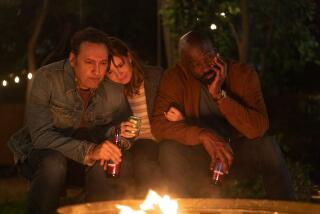‘Mad Men’ finale recap: There’s no place like om
Could it be that “Mad Men” is actually the origin story of a really famous commercial?
In a twist that no one could have predicted -- oh wait, someone kinda did -- the Series That Changed Television ends with Don Draper sitting in lotus pose on a cliff overlooking the Pacific at an Esalen-like spiritual retreat when -- ding! -- he suddenly envisions a chorus of fresh-faced, multiethnic young people singing in harmony about the transcendent power of Coca-Cola.
It’s an ending that’s as ambiguous, in its way, as the infamous finale of “The Sopranos.” Are we really meant to believe that Don dreamed up one of the most well-known television commercials of all time, an effective but deeply cynical ad that marked the end of the dream of the ‘60s as vividly as the Manson murders or Altamont? (Or, if you’re more contrarian, an ad that made it clear that the counterculture was always just another form of consumerism, as some like Thomas Frank have argued persuasively.) An ad whose back story is already well-documented and does not happen to include anything about a twice-divorced, former McCann executive on a quest to find himself in Big Sur?
Full Coverage: Everything “Mad Men”
Superimposing a fictional character onto a real-life historical event like this feels more “Forrest Gump” than “Mad Men,” which is why I’m inclined to think (or hope) we’re not meant to take Don’s cliff-side “a-ha!” moment literally. Instead, we can take it to mean that Don will always be an ad man, that even after what appears to be a cathartic emotional breakthrough, he is ready to pitch a fantasy, to sell a lie.
Literal or not, the ending certainly isn’t a hopeful one for Don, particularly coming at the tail end of a journey that has propelled him cross-country -- at top speed! -- to find himself, to outrun his past, or a little bit of both. The finale’s title, “Person to Person,” refers to the numerous operator-assisted phone calls that happen over the course of the hour but also, more symbolically, to Don’s attempt to find personal connection.
At seemingly every turn, he’s reminded of his isolation. In a heartbreaking, beautifully acted call to Betty, he offers to take care of the children after she dies. He clearly thinks he’s being gallant, but Betty shoots him down: They’re going to live with her brother and sister-in-law.
“I want to keep things as normal as possible,” she says, “and you not being here is part of that.”
Don realizes he can’t really argue with Betty, nor should he, and, as he has so many times before in times of crisis, he ventures to California. But once again the promise of the Golden State proves to be a mirage, as Stephanie, the one person in his life who still calls him Dick, also rejects him. “You’re not my family,” she tells him just hours before she takes off in the middle of the night with his car, leaving him stranded at the very end of the road.
It turns out she’s the one person who hasn’t entirely given up on him. In a phone call that plays like a micro-version of “The Suitcase,” Don confesses all his sins to Peggy: “I broke all my vows, I scandalized my child, I took another man’s name and made nothing of it.” Note the religious language here; Don has fully reverted to Dick.
Transportation challenges notwithstanding, I confess to being enormously frustrated by Don’s lingering at the retreat: Your kids need you, Don! Maybe skip the tai chi, get Peggy to send a driver, and get yourself to the airport pronto. Really, can it be that hard?
So when Don hangs up the phone and decides to go to yet another group seminar, I may have groaned out loud. And when, with eight minutes left in the entire series, we’re introduced to yet another new character -- an ordinary schmo named Leonard who, in a lengthy monologue, complains of feeling invisible to his wife, family and co-workers -- I became, well, distinctly irritated. Still, I appreciated on an intellectual level, that by hugging it out with someone who was so clearly intended to be his antithesis, Don was having a major breakthrough.
Or was he? Could it be that all that refrigerator talk just got Don thinking about Coke again? Maybe Don, more aware than ever of the acute lack of consistent, meaningful relationships in his own life, is inspired to sell the frankly ridiculous idea that Coke is the “real thing,” a balm capable of bringing disparate people together even at a time of war and social revolution.
As frustrating as it is on one level, it’s an ending that also makes sense. When “Mad Men” began, Don was the handsome man in a gray flannel suit who superficially embodied the 1950s ideal. A decade later, he is in a place that epitomizes the indulgent touchy-feeliness and narcissism-masquerading-as-self-actualization of the “Me Decade” (and embracing the go-go capitalism of the Reagan era). If Don started as a character from a John Cheever story, he ends the series as someone out of a Paul Mazursky film.
In this so-called Golden Age of TV, the burden of expectation going into a series finale can be excruciating, and there is by definition no way to please everyone. As Matthew Weiner himself has said, there are any number of episodes that could have served as series finales, so perhaps we shouldn’t think of “Person to Person” as the show’s definitive send-off (unless, of course, we want to). For me, the most resonant image from this final season was Bert Cooper’s posthumous song-and-dance routine, reminding Don (and us) that “the best things in life are free.” Even a Coke will cost you a dollar, adjusted for inflation.
Nearly every pivotal conversation in this episode takes place over the phone, a device that seems to allow people the distance to say what they really feel and the space to be who they really are. (As Stan tells Peggy: “I call you on the phone and I get the person I want to talk to.”) It makes me realize that some of the most pivotal confrontations in the series, including the end of both of Don’s marriages, have happened on the phone. (Note to self: Must pitch think piece on “Mad Men” and phones.)
Perhaps as a way of making up for the defiant lack of resolution of Don’s journey, Weiner puts a bow on everyone else’s story, providing such definitive closure for Roger, Peggy, Pete and Joan that moments in “Person to Person” felt almost like fan service.
After a string of comically awful relationships, Peggy winds up with Stan, the Harry to her Sally, the guy she once detested but who gradually became her confidante and, ultimately, her soulmate. It’s a very rom-com twist, but that isn’t necessarily a bad thing, particularly when the performances are as wonderful as they are here. (Mark my words, people years from now will be reciting Peggy’s delightfully fumbling “I don’t even think about you. I mean, I do, because you’re there” speech the same way they recite lines from Nora Ephron movies.)
Meanwhile, Joan completes her unlikely journey from semi-tragic bombshell to feminist heroine. As the hour begins, she’s enjoying a post-McCann life of leisure with Richard, lounging in Key West and indulging in a little coke (the other kind) for his birthday. It looks fun and makes for great postcards home, but a call from Ken sparks the realization that she’s interested in being more than “an undeveloped piece of real estate with a nice view,” to borrow Richard’s words.
In the end, it turns out that Joan wants to work -- not to secure Kevin’s future or even her own, but simply because it’s what makes her happy. So she starts a production company called Holloway-Harris because “you only need two names to make it real”; why not use her own? After all, by now Joan knows she’s her own best partner. (Just how complete is Joan’s transformation? She’s gone from pencil skirts to jumpsuits.)
Men not named Don don’t get quite as much airtime as Peggy or Joan, but their stories at least end happily. As roguishly charming as ever, Roger winds up with Marie, a woman who seems just crazy enough to be able to keep him in line, and comes as close as Joan will ever let him to openly claiming paternity of Kevin. Meanwhile, Pete boards a Learjet bound for Wichita with Tammy and an especially fabulous looking Trudy by his side. To quote that old sage, Meredith, “There are a lot of better places out there,” and it turns out Kansas is one of them.
Now, in the spirit of the emotional voyage that drove Don across the country to the cliffs of Big Sur and into the arms of a stranger named Leonard, I’d just like to say very sincerely how much I have loved writing about this show, how much it has meant to me and how much I am going to miss it.
Namaste, everyone.
Follow @MeredithBlake on Twitter.
ALSO:
‘Mad Men’ finale: Jon Hamm, Matthew Weiner are praised at after-party
‘Mad Men’ cast says goodbye with daylong blowout
See how the women of ‘Mad Men’ transformed on TV’s most feminist show
‘Mad Men’s’ Matthew Weiner greets the end with exhilaration, woe
More to Read
The complete guide to home viewing
Get Screen Gab for everything about the TV shows and streaming movies everyone’s talking about.
You may occasionally receive promotional content from the Los Angeles Times.






